牛津译林版英语7A Unit3知识归纳
译林版初一英语7A Unit3 Welcome to our school! 知识点讲解
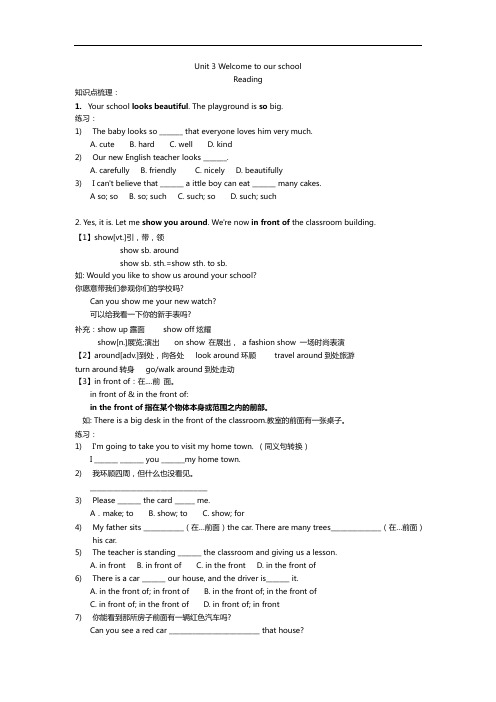
Unit 3 Welcome to our schoolReading知识点梳理:1.Your school looks beautiful. The playground is so big.练习:1)The baby looks so _______ that everyone loves him very much.A. cuteB. hardC. wellD. kind2)Our new English teacher looks _______.A. carefullyB. friendlyC. nicelyD. beautifully3)I can't believe that _______ a ittle boy can eat _______ many cakes.A so; so B. so; such C. such; so D. such; such2. Yes, it is. Let me show you around. We're now in front of the classroom building.【1】show[vt.]引,带,领show sb. aroundshow sb. sth.=show sth. to sb.如: Would you like to show us around your school?你愿意带我们参观你们的学校吗?Can you show me your new watch?可以给我看一下你的新手表吗?补充:show up露面show off炫耀show[n.]展览;演出on show 在展出,a fashion show 一场时尚表演【2】around[adv.]到处,向各处look around环顾travel around到处旅游turn around转身go/walk around到处走动【3】in front of:在....前面。
牛津译林版七年级英语上册Unit3单元知识点讲义
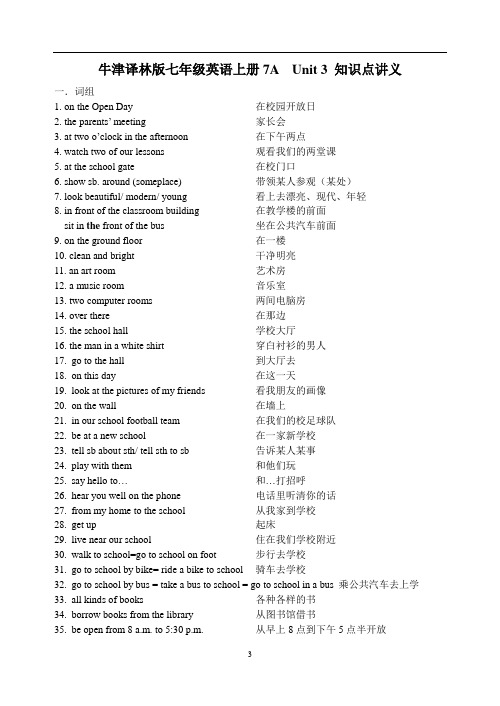
牛津译林版七年级英语上册7A Unit 3 知识点讲义一.词组1. on the Open Day 在校园开放日2. the parents’ meeting 家长会3. at two o’clock in the afternoon 在下午两点4. watch two of our lessons 观看我们的两堂课5. at the school gate 在校门口6. show sb. around (someplace) 带领某人参观(某处)7. look beautiful/ modern/ young 看上去漂亮、现代、年轻8. in front of the classroom building 在教学楼的前面sit in the front of the bus 坐在公共汽车前面9. on the ground floor 在一楼10. clean and bright 干净明亮11. an art room 艺术房12. a music room 音乐室13. two computer rooms 两间电脑房14. over there 在那边15. the school hall 学校大厅16. the man in a white shirt 穿白衬衫的男人17.go to the hall 到大厅去18.on this day 在这一天19.look at the pictures of my friends 看我朋友的画像20.on the wall 在墙上21.in our school football team 在我们的校足球队22.be at a new school 在一家新学校23.tell sb about sth/ tell sth to sb 告诉某人某事24.play with them 和他们玩25.say hello to…和…打招呼26.hear you well on the phone 电话里听清你的话27.from my home to the school 从我家到学校28.get up 起床29.live near our school 住在我们学校附近30.walk to school=go to school on foot 步行去学校31.go to school by bike= ride a bike to school 骑车去学校32.go to school by bus = take a bus to school = go to school in a bus 乘公共汽车去上学33.all kinds of books 各种各样的书34.borrow books from the library 从图书馆借书35.be open from 8 a.m. to 5:30 p.m. 从早上8点到下午5点半开放36.sing the English song 唱这首英文歌37.look left 向左看38.cross the road 过马路39.bring me a birthday cake= bring a birthday cake to me 给我拿一块生日蛋糕来40.take there 带到那儿去41.on your way back /home 在你回家的路上42.on his/her/their/our/my way to school 在他/她/他们/我们/我上学的路上43.like the number ninety-nine 喜欢99这个数字44.put his pencils and pens on the book 把他的铅笔和钢笔放在书上45.a few classrooms 几间教室46.a reading roon 一间阅览室47.live far away from the school 住得离学校远48.be kind to us 对我们很好49.get to school 到校二.句子1. Which of the subjects do you like best? 你最喜欢哪一门学科?=What’s your favourite subject?2. —What’s the date today? —It’s 9 October. 今天几号?十月九日—What day is it today? —It’s Sunday. 今天星期几?星期天3. What time is it? =What’s the time? 几点了?It’s two thirty. 两点半。
译林牛津7AUnit3重点难点讲解
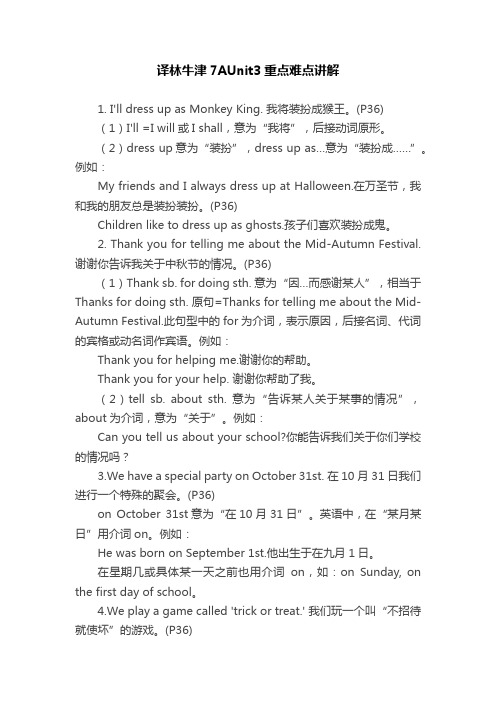
译林牛津7AUnit3重点难点讲解1. I'll dress up as Monkey King. 我将装扮成猴王。
(P36)(1)I'll =I will或I shall,意为“我将”,后接动词原形。
(2)dress up意为“装扮”,dress up as…意为“装扮成……”。
例如:My friends and I always dress up at Halloween.在万圣节,我和我的朋友总是装扮装扮。
(P36)Children like to dress up as ghosts.孩子们喜欢装扮成鬼。
2. Thank you for telling me about the Mid-Autumn Festival.谢谢你告诉我关于中秋节的情况。
(P36)(1)Thank sb. for doing sth. 意为“因…而感谢某人”,相当于Thanks for doing sth. 原句=Thanks for telling me about the Mid-Autumn Festival.此句型中的for为介词,表示原因,后接名词、代词的宾格或动名词作宾语。
例如:Thank you for helping me.谢谢你的帮助。
Thank you for your help. 谢谢你帮助了我。
(2)tell sb. about sth. 意为“告诉某人关于某事的情况”,about为介词,意为“关于”。
例如:Can you tell us about your school?你能告诉我们关于你们学校的情况吗?3.We have a special party on October 31st. 在10月31日我们进行一个特殊的聚会。
(P36)on October 31st意为“在10月31日”。
英语中,在“某月某日”用介词on。
例如:He was born on September 1st.他出生于在九月1日。
七年级英语上册Unit3知识梳理译林牛津版解读
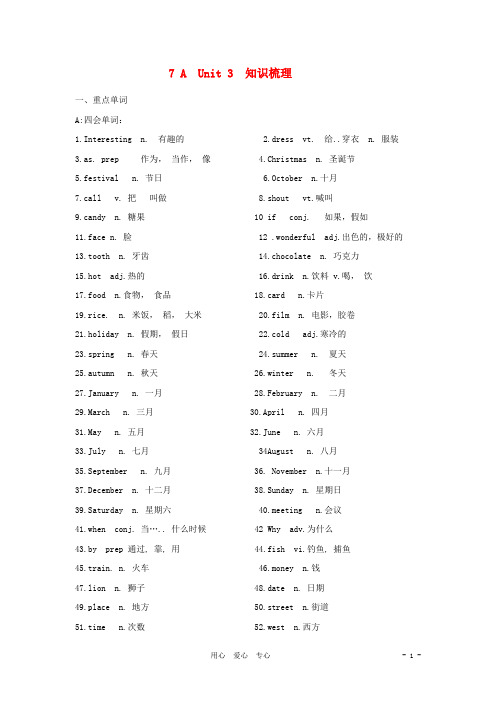
7 A Unit 3 知识梳理一、重点单词A:四会单词:1.Interesting n. 有趣的2.dress vt. 给..穿衣 n. 服装3.as. prep 作为,当作,像4.Christmas n. 圣诞节5.festival n. 节日6.October n.十月7.call v. 把叫做 8.shout vt.喊叫9.candy n. 糖果 10 if conj. 如果,假如11.face n. 脸 12 .wonderful adj.出色的,极好的13.tooth n. 牙齿 14.chocolate n. 巧克力15.hot adj.热的 16.drink n.饮料 v.喝,饮17.food n.食物,食品 18.card n.卡片19.rice. n. 米饭,稻,大米 20.film n. 电影,胶卷21.holiday n. 假期,假日 22.cold adj.寒冷的23.spring n. 春天 24.summer n. 夏天25.autumn n. 秋天 26.winter n. 冬天27.January n. 一月 28.February n. 二月29.March n. 三月 30.April n. 四月31.May n. 五月 32.June n. 六月33.July n. 七月 34August n. 八月35.September n. 九月 36. November n.十一月37.December n. 十二月 38.Sunday n. 星期日39.Saturday n. 星期六 40.meeting n.会议41.when conj. 当….. 什么时候 42 Why adv.为什么43.by prep 通过, 靠, 用 44.fish vi.钓鱼, 捕鱼45.train. n. 火车 46.money n.钱47.lion n. 狮子 48.date n. 日期49.place n. 地方 50.street n.街道51.time n.次数 52.west n.西方53.candle n. 蜡烛 54.way n. 方式, 方法55.light n. 光, 光线 56.warm adj 暖和的, 温暖的B: 单词转换:1.celebrate (v.)---celebration (n.)2.interest (n.)—interesting(adj.) interested(adj.)3.wonder(n.)---wonderful(adj) wonderfully(adv.)4.tooth(n.)---teeth(复数)5.cut—cut—cut(v.)6.nation(n.)----national(adj).7.excite---exciting/ excited (adj)8.穿过(prep.)----through(内部穿过) across(表面穿过)二、重点短语:1.Happy Halloween!万圣节快乐!2. New Year’s Day 新年,元旦3.Chinese New Year 春节4. .May Day 五一国际劳动节5.the Dragon Boat Festival 端午节,龙舟节6. the Mid--Autumn Festival 中秋节7. Children’s Day 儿童节8. Teachers’ Day 教师节9. National Day 国庆节10..celebrate Christmas 庆祝圣诞节11.at Easter在复活节12. Thanksgiving Day感恩节13.one’s favourite festival 最喜欢的节目.14dress up as 装扮,精心打扮15.have a long holiday 度一个长假16.have a party 开聚会17 play a game called“trick or treat”玩一个叫“不招待就使坏”的游戏a game calle d…=a game named …=a game with the name一个名叫…的游戏18. knock on/at 敲门19. play a trick on…对…使用诡计20. rice dumplings粽子21. traditional Chinese food 传统中国风味的食品22.lion dance 舞狮子23. .red packets 红包24. be on holiday 在度假25.this year 今年26.cut out 切成,剪成27.receive a letter from… 收到…..的来信28.hot drinks 热饮29.on the evening of October 31st 在十月31号的晚上30.look like看起来像31..see the doctor 看医生32..during the first week of November 在十一月的第一周期间33.go to school by bus 乘公共汽车上学34.be very excited 非常激动/兴奋35. at night 在夜晚36.on the other side of 在…的另一边37.try to do sth 努力做某事38.in the west 在西方,在西方国家39.in the USA 在美国40 .buy sb .Sth. 给某人买东西41. sharp teeth锋利的牙齿42. in the pencil case= in the pencil box在铅笔盒里43. chat with sb.on the Internet在互联网上与某人聊天44.plan to do sth. 计划做某事45. help sb. do sth. 帮助某人做某事46. so much如此(多),这么47. in many ways通过许多方式48. in a special costume穿特殊的服装49.tell sb. about sth. 告诉某人某事50. put up…on the wall把……挂在墙上51. at the weekend在周末52. make a plan制定计划53. from 9 p.m. to midnight从晚上9.00到午夜54.paint one’s face给某人的脸上涂上油彩.55.like to do sth. 喜欢做某事56. thank sb. for doing sth.感谢某人做某事57. give sb. sth. as a treat以……招待某人58.give us some candy as a treat= give us a treat of some candy59. special costumes with masks带面具的特别服装60. .make pumpkin lanterns制作南瓜灯61. make A out of B=make A from B用B制作A62. make sth. for sb.=make sb. sth. 为某人制作某物.…63.put sth. in=put sth. into…把某物放进64. want to do sth. 想要做某事65. at breakfast (lunch/ supper) 在吃早餐(午餐/晚餐)的时候66.Monkey King美猴王67.take sb. for a walk带某人去散步68.Christmas presents圣诞礼物69.shine through..照射过70. through the eyes透过眼睛71.go swimming 去游泳72.go to the Reading Club 去读书俱乐部73.like fishing 喜欢钓鱼74.take place发生75.talk about谈论三、语法A.时间介词的用法1.in+ 年/季节/月份eg: in 2008/ in spring/summer/autumn/ winterin January/February/ March/ April/ May/ June /July/ August/ September/October/November/December2.in+一天里的一段时间eg: in the morning/ afternoon/ evening3.on+具体的日子eg: on Monday (morning) on the night of September on a cold winter evening4.at+点时间eg: at 8 注:at Hawllowen/ night/ noonB.some 与 any 的用法1.Some1). 用于肯定句2). 用于婉转问句,或当我们提出要求或请求,又期望得到对方“肯定”的回答时。
Unit3知识点整理牛津译林版七年级英语上册
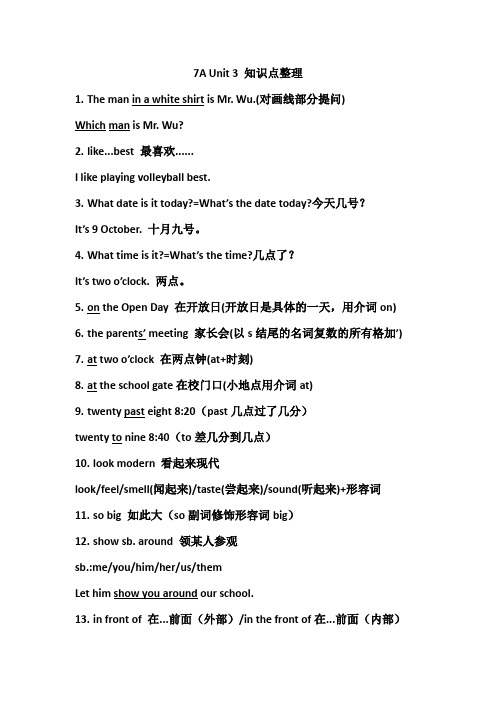
7A Unit 3 知识点整理1.The man in a white shirt is Mr. Wu.(对画线部分提问)Which man is Mr. Wu?2.like...best 最喜欢......I like playing volleyball best.3.What date is it today?=What’s the date today?今天几号?It’s 9 October. 十月九号。
4.What time is it?=What’s the time?几点了?It’s two o’clock. 两点。
5.on the Open Day 在开放日(开放日是具体的一天,用介词on)6.the parents’ meeting 家长会(以s结尾的名词复数的所有格加’)7.at two o’clock 在两点钟(at+时刻)8.at the school gate在校门口(小地点用介词at)9.twenty past eight 8:20(past几点过了几分)twenty to nine 8:40(to差几分到几点)10.look modern 看起来现代look/feel/smell(闻起来)/taste(尝起来)/sound(听起来)+形容词11.so big 如此大(so副词修饰形容词big)12.show sb. around 领某人参观sb.:me/you/him/her/us/themLet him show you around our school.13.in front of 在...前面(外部)/in the front of在...前面(内部)Miss Li is standing in the front of our classroom and writing some new words on the blackboard.There is a tree in front of our house.14.on the ground/first/second/third floor在一楼/二楼/三楼/四楼The cinema is on the third floor.15.two classroom buildings两栋教学楼名词修饰名词时一般第一个名词用单数,但也有一些特例:clothes shops/sports shops/women teachers/men doctors16.have meetings/have a meeting 开会I want to know when to have the meeting.17.the man in a white shirt/the man in white穿着白衬衫的男的/穿着白衣服的男的in介词+颜色/衣服:穿着......(状态) The man in white is my brother.wear动词+衣服:穿着......(状态) I wear a red coat today.put on动词短语+衣服:穿上......(动作)It’s cold outside. Please put on your coat.18.the man with glasses 戴眼镜的那个男的(with介词:戴着)Who is the man with glasses?(句中有谓语,用介词with)Daniel wears glasses.(句中无谓语,用动词wear作谓语)19.look(v.) at=have a look(n.) at 看一看......Let me look at the picture.=Let me have a look at the picture.20.the pictures of my friends 我朋友们的照片21.on the wall 在墙上There is a picture on the wall.(墙上挂的或贴的东西用on)There is a hole in the wall.(墙内部的用in)22.Let me see. 让我想想。
牛津译林版英语7A Unit3 Welcome to our school! 知识归纳与拓展

7A Unit 3 知识归纳与拓展【词汇解析】1.datedate作名词,意思是“日期”,一般多以句子形式出现。
“What's the date today?”用来询问“今天是几月几号?”,其回答用“It's+具体的日期”。
一What's the date today?今天是几月几日?一It's 10 September.今天是9月10日。
【辨析】“What day is it today?”用来询问“今天星期几?”,其回答用:“It's+具体的星期几”。
2.gategate作名词,意思是“大门;通道;大门口”,指上面与屋顶不相连的门,通常有两扇。
Look!A boy is at the zoo gate.看!一个男孩在动物园大门口。
【辨析】door作名词,意思是“门”,指上面连着屋顶的“门”,可指大楼房间或家具、车辆的“门”。
3.showshow作动词,意思是“引;带;领”,常构成短语show sb.around(带领某人参观)。
另外,show 还有“给某人看;显示”的意思,短语show sb.sth.一show sth.to sb.,表示“把某物给某人看”。
Let me show you around! 我带领你参观吧!Can you show it to me? 你能把它给我看看吗?【拓展】show还可以作名词,意思是“展览;演出”,常用短语为on show,意为“在展出”。
4.in front ofin front of意思是“在……的前面”,指位置“在……外部的前面”。
There is a garden in front of my house.我的房子前面有一个花园。
【辨析】in the front of意思是“在……的前面”,指位置“在……内部的前面”。
My father is in the front of the car.我父亲坐在轿车的前面。
苏教版(牛津译林)初中英语 初一上册7A Unit 3 知识点总结
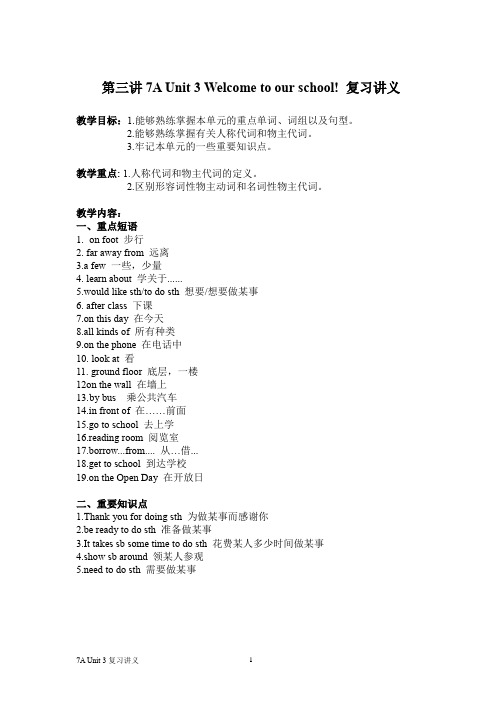
第三讲7A Unit 3 Welcome to our school! 复习讲义教学目标:1.能够熟练掌握本单元的重点单词、词组以及句型。
2.能够熟练掌握有关人称代词和物主代词。
3.牢记本单元的一些重要知识点。
教学重点: 1.人称代词和物主代词的定义。
2.区别形容词性物主动词和名词性物主代词。
教学内容:一、重点短语1.on foot 步行2. far away from 远离3.a few 一些,少量4. learn about 学关于......5.would like sth/to do sth 想要/想要做某事6. after class 下课7.on this day 在今天8.all kinds of 所有种类9.on the phone 在电话中10. look at 看11. ground floor 底层,一楼12on the wall 在墙上13.b y bus 乘公共汽车14.in front of 在……前面15.go to school 去上学16.reading room 阅览室17.borrow...from.... 从…借...18.get to school 到达学校19.on the Open Day 在开放日二、重要知识点1.Thank you for doing sth 为做某事而感谢你2.be ready to do sth 准备做某事3.It takes sb some time to do sth 花费某人多少时间做某事4.show sb around 领某人参观5.need to do sth 需要做某事三、重点必背句型:1.Welcome to our school.欢迎来到我们学校。
2.What’s the date today?今天几月几号3.Let’s meet at the school gate at 1:30.让我们1:30 在学校门口会面吧4.Who’s that man in the white shirt?穿白衬衫的那个男的是谁?5.There are all kinds of books in our library.在我们图书馆有各种各样的书6.I’d like to say hello to her.我想向她问好。
牛津英语7A Unit 3 welcome to our school 知识点总结梳理
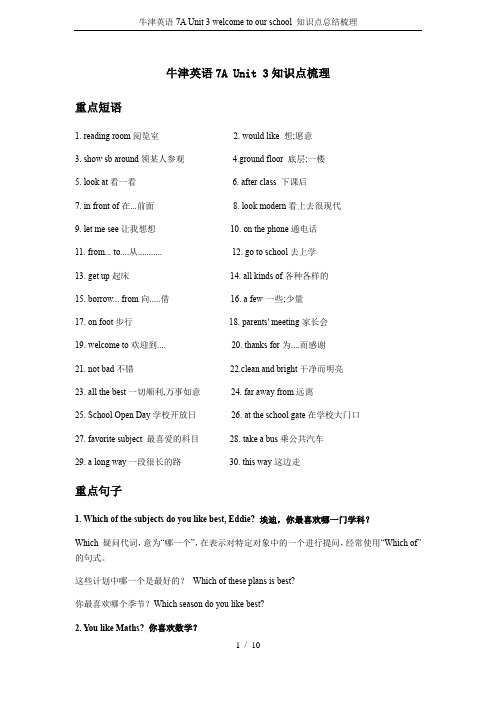
牛津英语7A Unit 3知识点梳理重点短语1. reading room阅览室2. would like 想;愿意3. show sb around领某人参观4.ground floor 底层;一楼5. look at看一看6. after class 下课后7. in front of在...前面8. look modern看上去很现代9. let me see让我想想10. on the phone通电话11. from... to....从........... 12. go to school去上学13. get up起床14. all kinds of各种各样的15. borrow... from向.....借16. a few-一些;少量17. on foot步行18. parents' meeting家长会19. welcome to欢迎到.... 20. thanks for为....而感谢21. not bad不错22.clean and bright干净而明亮23. all the best一切顺利,万事如意24. far away from远离25. School Open Day学校开放日26. at the school gate在学校大门口27. favorite subject 最喜爱的科目28. take a bus乘公共汽车29. a long way一段很长的路30. this way这边走重点句子1. Which of the subjects do you like best, Eddie? 埃迪,你最喜欢哪一门学科?Which 疑问代词,意为“哪一个”,在表示对特定对象中的一个进行提问,经常使用“Which of”的句式。
这些计划中哪一个是最好的?Which of these plans is best?你最喜欢哪个季节?Which season do you like best?2. You like Maths? 你喜欢数学?此处陈述句加问号,朗读时用升调,表示疑问,一般用来表示对某事不确定、惊奇或怀疑等。
- 1、下载文档前请自行甄别文档内容的完整性,平台不提供额外的编辑、内容补充、找答案等附加服务。
- 2、"仅部分预览"的文档,不可在线预览部分如存在完整性等问题,可反馈申请退款(可完整预览的文档不适用该条件!)。
- 3、如文档侵犯您的权益,请联系客服反馈,我们会尽快为您处理(人工客服工作时间:9:00-18:30)。
7A Unit3 知识归纳与拓展【词汇解析】1.datedate作名词,意思是“日期”,一般多以句子形式出现。
“What’s the date today?”用来询问“今天是几月几号?”,其回答用“It’s+具体的日期”。
一What’s the date today?今天是几月几日?一It’s 10 September.今天是9月10日。
【辨析】“What day is it today?”用来询问“今天星期几?”,其回答用:“It’s+具体的星期几”。
2.gategate作名词,意思是“大门;通道;大门口”,指上面与屋顶不相连的门,通常有两扇。
Look!A boy is at the zoo gate.看!一个男孩在动物园大门口。
【辨析】door作名词,意思是“门”,指上面连着屋顶的“门”,可指大楼房间或家具、车辆的“门”。
3.showshow作动词,意思是“引;带;领”,常构成短语show sb.around(带领某人参观)。
另外,show还有“给某人看;显示”的意思,短语show sb.sth.一show sth.to sb.,表示“把某物给某人看”。
Let me show you around! 我带领你参观吧!Can you show it to me? 你能把它给我看看吗?【拓展】show还可以作名词,意思是“展览;演出”,常用短语为on show,意为“在展出”。
4.in front ofin front of意思是“在……的前面”,指位置“在……外部的前面”。
There is a garden in front of my house.我的房子前面有一个花园。
【辨析】in the front of意思是“在……的前面”,指位置“在……内部的前面”。
My father is in the front of the car.我父亲坐在轿车的前面。
5.taketake作动词,意思是“花费”,表示“做某事花费某人多长时间”用句型“It takes sb.some time to do sth.”,其中it是形式主语,真正的主语是后面的to do sth.。
It takes me an hour to do homework everyday.我每天花一小时做家庭作业。
6.kindkind作名词,意思是“种类”,常构成短语all kinds of(各种各样的)。
The kind of fruit is very nice.这种水果很好。
There are all kinds of food on the table.桌子上有各种各样的食物。
【拓展】kind还可作形容词,意思是“善良的,友好的”,与nice或friendly同义,常构成短语be kind/nice/friendly to sb.,表示“对某人友好”。
7.borrowborrow作动词,意思是“借,借用”,通常指“向别人借”。
表示“向某人借某物”用borrow sth.from sb.May I borrow your pen? 我可以借你的钢笔吗?Tom often borrows some money from his friends.汤姆经常向他的朋友们借一些钱。
8.a fewa few意思是“一些,少量”,用来修饰可数名词的复数形式,表示肯定的意义。
His sister has a few books in her schoolbag.他姐姐书包里有一些书。
【辨析】单独使用few,意思是“不多(的),少数(的)”,也用来修饰可数名词的复数形式,但表示否定的意义。
The boy has few books in his schoolbag.这个男孩的书包里几乎没有书。
9.on footon foot意思是“步行”。
表示“步行上学”用go to school on foot。
His brother goes to school on foot.他哥哥步行去上学。
Do you often go home on foot.你经常步行回家吗?【拓展】短语go to…on foot与walk to…同义。
但短语“步行回家”用go home on foot或walk home。
【注意】“步行”用on foot,但“乘公共汽车”用by bus。
【短语归纳】1.the parents’meeting家长会2.meet at the school gate在校门口见面3.welcome to our school欢迎来到我们学校4.show sb.around带领某人参观5.clean and bright干净明亮6.look modern看起来现代7.have meetings开会8.in a white shirt穿一件白色衬衫9.1et me see让我想想10.after class下课以后11.say hello to sb.向某人问好12.hear sb.well听清某人的话13.on the phone通电话;在电话中14.how long多长时间15.on one’s way back在某人返回的途中16.be open开放17.a11 kinds of books各种各样的书18.borrow books from the library从图书馆借书19.far away from my home离我家很远20.take a bus to school乘公共汽车上学【句型分析】1.Which of the subjects do you like best,Eddie?(P30)埃迪,你最喜欢什么学科?本句中which意为“哪个(些)”,常对同类事物中某一个(些)提问。
Which is your favourite room?哪一个是你最喜欢的房间?Which book do you want to buy?你想要买哪本书?2.So I can eat three!(P30)所以我可以吃三个!本句中so为连词,意为“因此,所以”,连接状语从句;引导的从句通常放在主句之后。
Amy likes English,so she often reads it in the morning.埃米喜欢英语,所以她经常在早晨读英语。
【注意】汉语中通常用“因为……所以……”来表示因果关系,但在英语中,通常用了because 就不能再用so;用了so,就不能再用because。
She gets up late,so she is late for school every day.=She is late for school every day because she gets up late.她起床晚,所以她每天上学都迟到。
3.Pardon?(P36)什么?请再说一遍。
本句通常用来请求对方重复刚才所说的话.相当于:Say it again,please.,有时我们也可用I beg your pardon!来表示。
—Read the instructions for your classmates,please.请向同学们读一下说明。
—I beg your pardon!/Pardon?请再说一遍,好吗?I ask you to read the instructions for your classmates.我请你向同学们读一下说明。
4.How does she get to school?(P37)她是怎么到学校的?这是一种询问“交通方式”的问句,其中get to意为“到达……”,回答通常是表示交通方式的词语或句子,如:on foot(步行),by bus/car/train/plane…(坐公交车/汽车/火车/飞机……)。
——How does Millie get to the school every day?米莉每天怎样来学校的?一By bus./On foot./By car.乘公交车。
/步行。
/乘汽车。
How do the students get to the cinema? 学生们怎么去电影院呢?5.It takes me about half an hour.(P38)我大约花半个小时。
It takes(sb.)some time to do sth.意思是“花费(某/v)……时间做某事”。
其中it是形式主语,真正的主语是to do sth.。
It takes her two hours to walk home every day.她每天花两小时走回家。
【注意】本句型也能替换成:sb.spend(s)sometime doing sth.,因此上一句可转换成:She spends two hours walking home every day.6.I live far away from the school.(P40)我住得离学校远。
此处far为副词,指距离上的“遥远”或“远离”,常用的搭配有far away from,意为“远离……”。
The village is far away from here.那个村庄离这儿很远。
I know a nice little Italian restaurant not far from here.我知道有家不错的意大利小餐馆离这儿不远。
另外,我们还可以用how far来询问距离。
How far is the school from your home? 你家离学校有多远?How far can you throw? 你能扔多远?【语法点拨】人称代词的主格和宾格人称代词是用来代表人或事物的代词,有人称、数(单复数)、格(主格、宾格)以及性别(男女)的变化。
人称代词分为主格和宾格两种形式。
其变化规律如下表所示:1.人称代词的主格人称代词的主格分为单数:I,you,he,she,it和复数:we,you,they。
人称代词的主格在句中作主语。
I have many new friends.They are all very nice.我有很多新朋友。
他们都非常好。
Are you in Class 4,Grade ? 你在七年级四班吗?Kitty is cute.She loves dancing.基蒂很可爱。
她喜欢跳舞。
2.人称代词的宾格人称代词的宾格也分为单数:me,you,him,her,it和复数:us,you,them。
人称代词的宾格在句中作动词或介词的宾语。
Thank you for helping me with my homework.谢谢你帮助我做家庭作业。
(作动词宾语) My school is beautiful.I like it very much.我的学校很漂亮。
